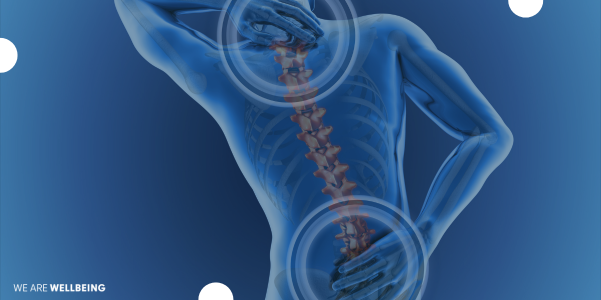The food we eat plays an important part in our overall health and wellbeing. And whilst this is no surprise, incorporating healthy food habits into a busy lifestyle can be difficult. Pair this with all of the mixed messages and opinions circulating in the news and on social media, it can be hard to know where to start! But even small changes can reduce the risk of certain disease, increase energy levels and leave you feeling more satisfied.
In this blog, we have broken down some practical ways to improve your nutrition in the workplace, these are aimed to support even the busiest of lifestyles.
What can I do?
Regular eating
Aiming to eat every 3-4 hours can support consistent energy levels, regulate blood glucose, and prevent overeating later in the day. Meals and snacks don’t have to be fancy, but try to build a routine. Planning ahead and keeping snacks handy can really help here – keep reading for more on this!
Pack in the Protein
Protein has become a bit of a buzzword, but it is important for many reasons. Including muscle repair and growth, immune function, and weight management. It can also help you feel fuller for longer, and more able to focus on work.
Try to include a protein source at every meal, this could include meat, fish, eggs, nuts, tofu, beans, cheese and yoghurt. Begin with one meal at a time, e.g., having a protein packed breakfast to start the day.
Focus on Fibre
Adequate fibre is linked to improved heart health and a reduced risk of bowel cancer and Type 2 Diabetes. It can also improve digestion, and helps to keep you satiated. Yet it often gets overlooked. In fact, 96% of adults in the UK do not meet the daily recommendation of 30g.
Add foods such as wholemeal breads and pastas, a wide range of fruit and veg, potato with the skin on and cereals including Weetabix and oats.
Sort your Snacking
Snacking can provide much needed energy and stop you from getting too hungry between meals. However, mindless snacking can easily become a habit whilst working.
It might sound obvious, but incorporating fruit and vegetables into your snacking can be a real winner, especially considering a large proportion of adults in the UK don’t meet the 5 a day recommendation. Some ideas include apple with peanut butter, a banana, a piece of fruit with a handful of nuts, and vegetable sticks with houmous.
The Association of UK Dietitians has more info and ideas for snacking.
Meal preparation
The term meal prep may conjure thoughts of slaving away in the kitchen, and a freezer full of labelled tubs. But it can be much simpler than this, and some sort of planning can support your goals during the week, when you want good food choices to feel as easy as possible.
Lunch is a good meal to start with, and there are many ‘convenient’ foods which make it easy to throw a balanced lunch together. Some of our favourites include tinned tuna, bagged salad, boiled eggs, and microwavable rice and grain pouches.
The NHS have some great recipes ideas for the whole family.
Mindful meals
Do you eat in your car? At your desk? During a meeting? Whilst this cannot always be avoided, mindful eating can be linked to improved digestion, increased food enjoyment and the ability to better notice hunger and fullness signals.
Mindful eating means really being in the present moment when you consume food. It could involve slowing down, removing distractions, actually taking a lunchbreak and really taking time to taste your food. Even one meal a week is a great start.
Conclusion
Supporting employees with their wellbeing is crucial for any business, and nutrition plays a big part in this. Helping your colleagues to eat well, and make informed choices can increase productivity, decrease illness and make for a happier, healthier workforce.
Here at We Are Wellbeing we can support you through expert nutrition webinars and workshops, and 1:1 coaching. Get in touch for find out more.







